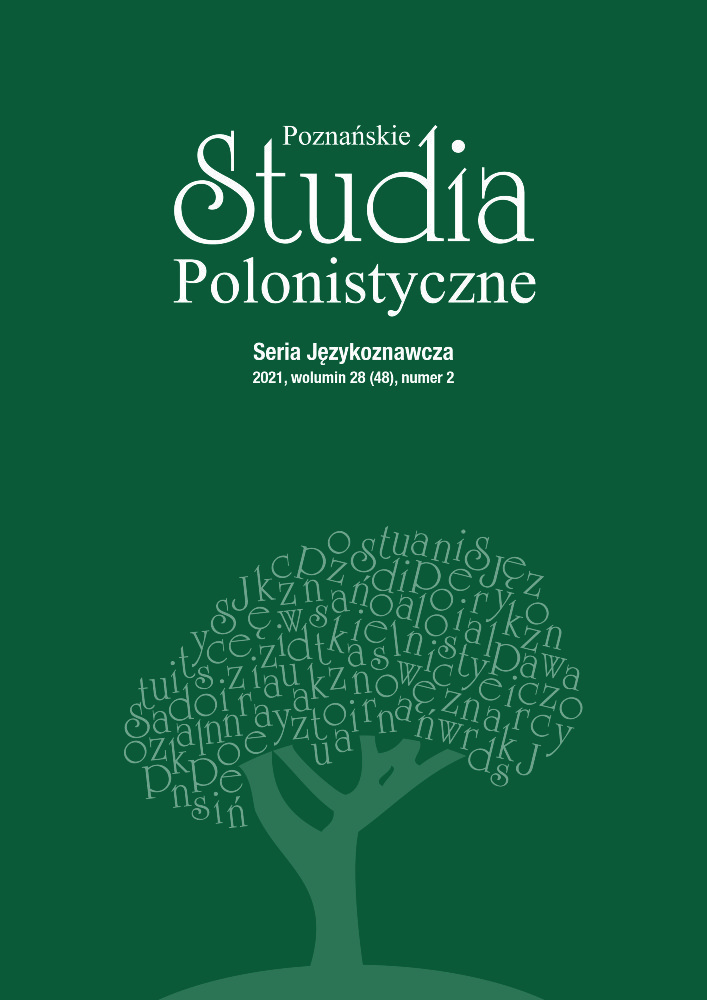Abstract
The aim of the article is to present how the approach towards linguistic correctness of current users of the Polish language is reflected in Internet memes. The starting point is the assumption that language norms in online communication are treated in a different manner than usual. However, the high frequency of deviations from norms in online texts (especially in memes) does not mean a simple neglecting of the rules of linguistic correctness, as it includes both unintentional and accidental breaches of norms (coming from ignorance, lack of knowledge of rules or carelessness) and intentional actions of functional character, dictated mostly by treating the language in a ludic manner. In this article, the analysis of deviations from norms in memes is subordinated to presenting their purpose, which could be one of the following: linguistic fun, satire, anarchist defiance or provocation, attracting attention of recipients in order to distinguish the meme among massive amounts of information, and the diagnosis of linguistic correctness of specific people or representatives of various social groups (e.g. junior high school students, sports fans, blokers, sports commentators, teachers, elderly women). Moreover, creating negative protagonists of memes by attempting to imitate their language, which consists mostly of repeating their linguistic errors, allowed for the recreation of linguistic awareness of Internet users, e.g. for indicating the most ridiculed types of errors (spelling, phonetic and lexical). The key conclusion from the analysis is the indication of memes exemplifying the alignment with norms as a value, even if its appreciation is preceded by the (apparent) rejection of all rules.
References
Abriszewski Krzysztof (2012), Poznanie, zbiorowość, polityka. Analiza teorii aktora sieci Bruno Latoura, Kraków.
Biniewicz Jerzy (2014), Dyskurs publiczny (na przykładzie internetowego portalu prasowego) w świecie Web 2.0, w: Komunikacja w stechnicyzowanym świecie. Wpływ postępu technicznego na język i literaturę, red. Agnieszka Niekrewicz, Bogdan Walczak, Jowita Żurawska-Chaszczewska, Gorzów Wielkopolski, s. 7–24.
Grybosiowa Antonina (1998a), Liberalizacja społecznej oceny wulgaryzmów, w: Człowiek – dzieło – sacrum, red. Stanisław Gajda, Helmut S. Sobeczko, Opole, s. 361–369.
Grybosiowa Antonina (1998b), Przyczyny zmian w polskim systemie adresatywnym, w: Język w mieście. Problemy kultury i poprawności, red. Kazimierz Michalewski, Łódź, s. 57–61.
Grybosiowa Antonina (1999), O współczesnym stosunku do normy językowej, „Poradnik Językowy”, z. 8–9, s. 6–13.
Grzenia Jan (2016), Co język polski zawdzięcza Internetowi, w: Język w Internecie. Antologia, red. Małgorzata Kita, Iwona Loewe, Katowice, s. 90–100.
Kita Małgorzata (2016), Językoznawcy wobec badań języka w Internecie, „Artes Humanae”, t. 1, s. 111–124.
Klemensiewicz Zenon (1947), Gramatyka współczesnej polszczyzny kulturalnej w zarysie, Wrocław – Warszawa.
Kłosińska Katarzyna (2017), Istnienie i kształt normy językowej po przełomie cyfrowym, „Bulletin de la Société Polonaise de Linguistique”, t. 78, s. 81–89.
Koza Michał (2015), Czy znasz ten mem? Pragmatyka i polityka internetowych wspólnot interpretacyjnych, „Teksty Drugie”, nr 3 (153), s. 236–245, https://tinyurl.com/f8vx67x5 [dostęp: 7 listopada 2021].
Kurkowska Halina (1977), Polityka językowa a zróżnicowanie społeczne współczesnej polszczyzny, „Socjolingwistyka”, t. 1, s. 17–25.
Markowski Andrzej, Puzynina Jadwiga (2001), Kultura języka, w: Współczesny język polski, red. Jerzy Bartmiński, Lublin, s. 49–71.
Miodek Jan (2001), O normie językowej, w: Współczesny język polski, red. Jerzy Bartmiński, Lublin, s. 73–83.
Niekrewicz Agnieszka (2015), Od schematyzmu do kreacyjności. Język memów internetowych, Gorzów Wielkopolski.
Niekrewicz Agnieszka (2016), Funkcjonalne naruszenia normy ortograficznej w memach internetowych, „Poznańskie Spotkania Językoznawcze”, nr 32, s. 93–103.
Markowski Andrzej, red. (1999), Nowy słownik poprawnej polszczyzny, Warszawa.
Walczak Bogdan (1995), Przegląd kryteriów poprawności językowej, „Poradnik Językowy”, z. 9–10, s. 1–16.
Walczak Bogdan (2012), Czy zaleje nas fala wulgaryzmów?, „Polonistyka”, nr 6, s. 51–52.
License
Authors
The Author declares that they are entitled to personal and property (material) copyrights to their work published in “Poznańskie Studia Polonistyczne. Seria Językoznawcza”, and that these rights are not limited by the terms of Author’s agreement. The Author warrants the originality, authorship, and sole ownership of all rights to the Work, and affirms that they have the right to grant all kinds of licenses hereinabove without infringing on the intellectual property rights of any third party, including personal rights.
The Author(s) retains copyright to their article and the right to freely dispose of the work, granting Adam Mickiewicz University in Poznań a non-exclusive, royalty-free licence under the Attribution-NoDerivatives 4.0 International (CC BY-ND 4.0) Creative Commons licence to use the Work without territorial restrictions for an indefinite period in the fields of use designated in the Author’s agreement.
Users
Interested Internet users are entitled to use works published in „Poznańskie Studia Polonistyczne. Seria Językoznawcza” since 2016 under the following conditions:
- attribution - obligation to provide, together with the distributed work, information about the authorship, title, source (link to the original work, DOI) and the license itself.
- no derivatives - the work must be preserved in its original form, without the author's consent it is not possible to distribute the modified work, such as translations, publications, etc.
Copyrights are reserved for all texts published before 2016.
Other
Adam Mickiewicz University in Poznań retains the right to the journal as a whole (including its layout, graphic design, title, cover design, logo and more).

